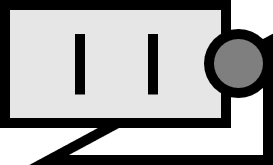Geodesic Coordinate Mapping and Gaussian Curvature
Theorem1
The metric matrix of the geodesic coordinate mapping $\mathbf{x} : U \to \mathbb{R}^{3}$ is as follows.
$$ \left[ g_{ij} \right] = \begin{bmatrix} 1 & 0 \\ 0 & h^{2} \end{bmatrix} \quad (h \gt 0) $$
Then, the Gaussian curvature of $\mathbf{x}$ is as follows.
$$ K = -\dfrac{h_{11}}{h} $$
At this time, $(u^{1}, u^{2})$ is the coordinate of $U$, and $h_{i} = \dfrac{\partial h}{\partial u^{i}}$.
Proof
$$ K = \dfrac{\sum\limits_{\ell} R_{121}^{\ell}g_{\ell 2}}{g} $$
Here, $R_{ijk}^{\ell}$ is the coefficient of the Riemann curvature tensor, and $g$ and $g_{ij}$ are coefficients of the Riemann metric.
Since $g_{12} = 0$, only $R_{121}^{2}$ needs to be calculated from Gauss’ theorem. By definition,
$$ R_{121}^{2} = \dfrac{\partial \Gamma_{11}^{2}}{\partial u^{2}} - \dfrac{\partial \Gamma_{12}^{2}}{\partial u^{1}} + \sum\limits_{p=1}^{2} \left( \Gamma_{11}^{p}\Gamma_{p2}^{2} - \Gamma_{12}^{p}\Gamma_{p1}^{2} \right) $$
Where, $\Gamma_{ij}^{k}$ is the Christoffel symbol. The Christoffel symbols of the geodesic patch are as follows.
Christoffel symbols of geodesic coordinate mapping
Except for the following, everything is $0$.
$$ \Gamma_{22}^{1} = -hh_{1},\quad \Gamma_{12}^{2} = \Gamma_{21}^{2} = \dfrac{h_{1}}{h},\quad \Gamma_{22}^{2} = \dfrac{h_{2}}{h} $$
Therefore, we obtain the following.
$$ \begin{align*} R_{121}^{2} &= \dfrac{\partial \Gamma_{11}^{2}}{\partial u^{2}} - \dfrac{\partial \Gamma_{12}^{2}}{\partial u^{1}} + \sum\limits_{p=1}^{2} \left( \Gamma_{11}^{p}\Gamma_{p2}^{2} - \Gamma_{12}^{p}\Gamma_{p1}^{2} \right) \\ &= - \dfrac{\partial }{\partial u^{1}}\dfrac{h_{1}}{h} + \sum\limits_{p=1}^{2} \left( - \Gamma_{12}^{p}\Gamma_{p1}^{2} \right) \\ &= - \dfrac{h_{11}h - h_{1}h_{1}}{h^{2}} - \Gamma_{12}^{1}\Gamma_{11}^{2} - \Gamma_{12}^{2}\Gamma_{21}^{2} \\ &= - \dfrac{h_{11}h - h_{1}h_{1}}{h^{2}} - \dfrac{(h_{1})^{2}}{h^{2}} \\ &= - \dfrac{h_{11}}{h} \end{align*} $$
Hence, the Gaussian curvature, since $g_{22} = g = h^{2}$,
$$ K = \dfrac{R_{121}^{2}g_{22}}{g} = \dfrac{\left( - \dfrac{h_{11}}{h} \right) h^{2}}{h^{2}} = - \dfrac{h_{11}}{h} $$
■
Richard S. Millman and George D. Parker, Elements of Differential Geometry (1977), p179 problem 2.3 ↩︎
